Covid-19: Fiocruz expands national testing capacity
17/08/2020
Aline Camera and Matheus Cruz
Since the confirmation of the first cases of Covid-19, Fiocruz, an institution linked to the Ministry of Health, has been working to provide responses in different areas. After developing molecular tests to detect the disease and progressively increasing their production scale, the Foundation now begins the operation of one more Support Unit to the Diagnostic of Covid-19 (click here for a virtual tour of the Unit). The initiative is part of the support strategy for the Central Laboratories of Public Health (Lacen) and for the expansion of the national capacity of sample processing, a fundamental action for the epidemiological surveillance of the virus and for facing the pandemic.
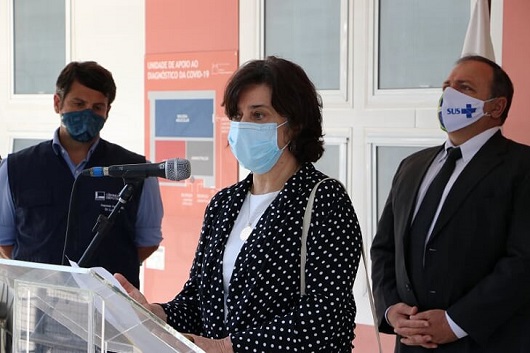
Fiocruz president, Nísia Trindade Lima, reinforced the institution’s commitment to the fight against the pandemic with public health actions focused on strengthening the Brazilian Public Health System (SUS, in the Portuguese acronym) and considering the scientific and technological foundation for this development (photo: Peter Ilicciev)
During a visit to the unit, Fiocruz president, Nísia Trindade Lima, reinforced the institution’s commitment to the fight against the pandemic with public health actions focused on strengthening the Brazilian Public Health System (SUS, in the Portuguese acronym) and considering the scientific and technological foundation for this development. “Testing is fundamental in all phases of the control of this pandemic, and the goal of Fiocruz is to add its skills and contribute in this very delicate moment. We hope to be part of the response to this humanitarian crisis we have been living since the beginning of the pandemic. Our 120 years’ tradition and our presence in all regions of Brazil allow us to contribute with the Ministry of Health in the national testing strategy”, she stated.
The interim minister of health, Eduardo Pazuello, emphasized the importance of surveillance in health and epidemiology for the early treatment of Covid-19. “We are all revising our protocols on a daily basis in a search for what can be improved and changing what is not working. Diagnosis and testing are the foundation of early treatment. It is from this standpoint that Fiocruz takes another step in its internal structure, which will continue after the pandemic, with the Support Unit for the Diagnosis of Covid-19.”
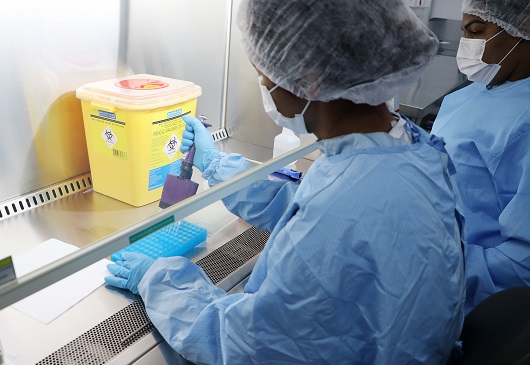
With the potential to process up to 15,000 molecular tests daily, the new unit is located at the Foundation's headquarters in Rio de Janeiro (photo: Peter Ilicciev)
With potential to process up to 15,000 molecular tests per day, the new unit is located at the headquarters of the Foundation, and has had its structure and equipment financed by the Todos pela Saúde initiative. “We are aware of the importance of testing, of epidemiological management and of the context of this moment. It is a huge pleasure to participate in this initiative that shows the commitment of Itaú for this country. It is important to highlight that the project is a legacy that can be used in the future, not only for this pandemic, but for other challenges in the field of public health”, said the vice-president of the Itaú Bank and representative of the bank at the Managing Committee of the Todos pela Saúde initiative, Claudia Politanski. The entire operation will be funded by the Ministry of Health.
The Manguinhos campus, which had already been operating with platforms implanted at the Immunobiologica Technology Institute(Bio-Manguinhos) and at the Oswaldo Cruz Institute (IOC), now has the capacity to release about 17,500 results per day. Another Support Unit, at the Ceará regional branch, is expected to begin operating in August, with a daily processing capacity of up to 10,000 molecular tests.
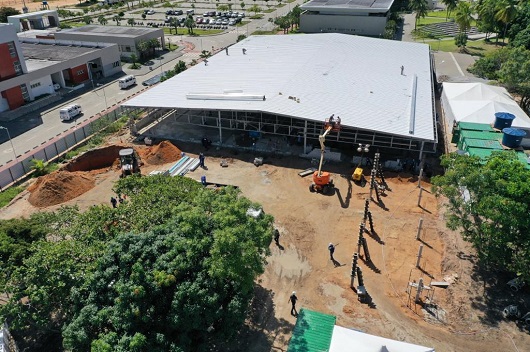
Another Support Unit, in the Ceará region, is expected to start operating in August, and can perform up to 10,000 molecular tests daily (photo: Fiocruz)
Built based on similar plants and in an emergency setting, the new installations in Rio de Janeiro and Ceará occupy an area of approximately 2,300 square meters each. Equipped with platforms that use real-time PCR, the units have the potential to work 24/7. It is expected that more than 350 professionals, including biologists and qualified lab technicians, will be working in three workshifts to process the samples sent in by the Ministry of Health.
Expansion project
In April, the Foundation began to combine its acquired expertise and the technological infrastructure available to install Units of Support to the Diagnosis of Covid-19. In addition to Rio de Janeiro, the states of Paraná and São Paulo were the first to be contemplated with the platforms, that can process in large scale the samples with suspicion of the disease. The equipments were installed by Bio-Manguinhos at the Fiocruz campus, at the Institute of Molecular Biology of Paraná (IBMP), and at the Dasa group, by means of an agreement with the Ministry of Health. With the exception of the latter two, the operationalization of the equipment is entirely managed by Fiocruz, working from installation to personnel training, and including supply of all the necessary materials and technical assistance.
So far, mobilization to expand testing capacity relied exclusively on resources from the Ministry of Health, already decentralized to Fiocruz and using equipment available at Bio-Manguinhos. The project of the Units in the states of Rio de Janeiro and Ceará also kickstarted a new phase, marked by the support of the private sector. To make this second moment possible, in addition to the important financing provided by the Ministry of Health, which will be applied on the actual functioning of both units, including, among others, the hiring of human resources and the acquisition of the necessary materials, Fiocruz also received donations amounting to about 200 million Brazilian reais.
The Todos pela Saúde initiative, led by Brazilian bank Itaú Unibanco, destined more than 180 million Brazilian reais to the project. The sum was employed in the purchasing of new equipment for both centrals and for the physical structure of the Rio de Janeiro unit. The costs of the works in Ceará, as well as the acquisition of further machines, had the contribution of Bradesco and Banco do Brasil, by means of EloPar, and of the UnitedHealth Group Brasil (UHG), which donated 20 million and 5,3 million reais, respectively, to the cause.
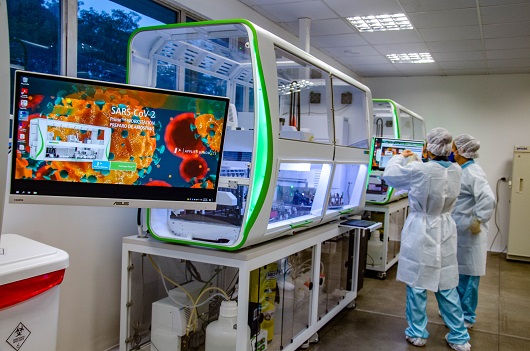
The equipments were installed by Bio-Manguinhos at the Fiocruz campus, at the Institute of Molecular Biology of Paraná (IBMP), and at the Dasa group, by means of an agreement with the Ministry of Health. (photo: IBMP, Itamar Crispim)
With the contribution of these new centrals, the number of RT-PCR tests processed per month can reach a million once the Support Units are fully operational. “The capacity of these units was planned keeping in sight the establishment of a more massive testing strategy now ongoing thanks to the Ministry of Health. Right now, we are working to provide support to the great demand of the Lacens”, noted the vice-president of Production and Innovation in Health of the Foundation, Marco Krieger.
In addition to the RT-PCR tests, the new units in Rio de Janeiro and Ceará have also been contemplated, in the donation received from Todos pela Saúde, with modern platforms to perform large-scale serological tests. Based on the detection of immune response following infection, these tests are complementary in the facing of the pandemic, and are already being made to support epidemiological surveys, evaluations in vulnerable populations, among others. The action combines the nominal capacity of 12 thousand tests per day at each of the new centrals, offering additional support to the public system of surveillance in health.
Articulated actions
The expansion of the national testing capacity involved three central pillars of action of Fiocruz, which took place in a complementary manner: the development and the production of tests in large scale; regional reinforcement of Lacens and of the logistics of materials and samples all over the national territory, as well as establishment of Units of Support for the Diagnosis of Covid-19. “It is important to highlight that other partnerships and arrangements are still ongoing involving the Ministry of Health, Fiocruz and several universities and research institutions, with the goal of further expanding the national testing capacity”, notes the coordinator of Surveillance in Health and of Reference Laboratories of Fiocruz, Rivaldo Venâncio.
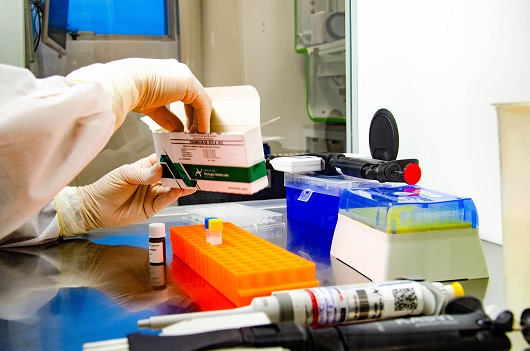
The commitment signed with MoH, foresees a total of 11.7 million tests (photo: Itamar Crispim)
In March, while the pandemic was advancing markedly in European countries and making its first victims in Brazil, Fiocruz began the process of progressive scaling of its production of diagnostic tests. In the last week of June, production had reached a capacity of 2 million tests per month at Bio-Manguinhos and an accumulated amount exceeding 5 million tests delivered to the Ministry by Fiocruz. The agreement signed with the Ministry of Health involves a total of 11.7 million tests. The delivery schedule is defined together with the Ministry of Health, to better respond to its strategy of distribution and to the needs of the laboratories of the public health network and of the Support Units.
If, on the one hand, production was going on full force, on the other hand it was necessary to strengthen the other extremety, involving diagnosis itself, to respond to the increasing demand of sample processing. That was when Fiocruz units, present in all regions in the country, mobilized to help the Lacens of their respective locations. In addition to these labs, the Lacen of the state of Santa Catarina, located in the capital, Florianópolis, as well as the reference laboratories at the Oswaldo Cruz Institute, in Rio de Janeiro, and at the Evandro Chagas Institute, in the state of Pará, received platforms installed by Bio-Manguinhos. The city of Ribeirão Preto, in the state of São Paulo, also received the reinforcement of a piece of equipment that has been operated by professionals located at the Platform of Translational Medicine Fiocruz-USP.
With these actions, therefore, Fiocruz contributes in a decisive manner with the Ministry of Health in order to reach the testing goals, helping with the distribution of molecular tests in the necessary numbers, cooperating with the management of material logistics and distribution of samples to the Lacens and support units, and now also offering a significant capacity of processing of suspicious samples. The investment on the different actions by Fiocruz in the sector of testing amounted to about 930 million Brazilian reais.




